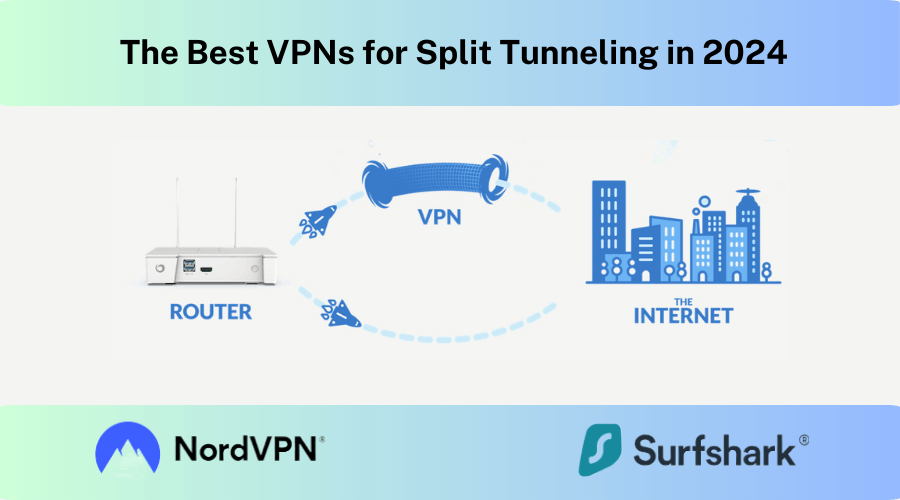The Best VPNs for Split Tunneling in 2024
Table of Contents
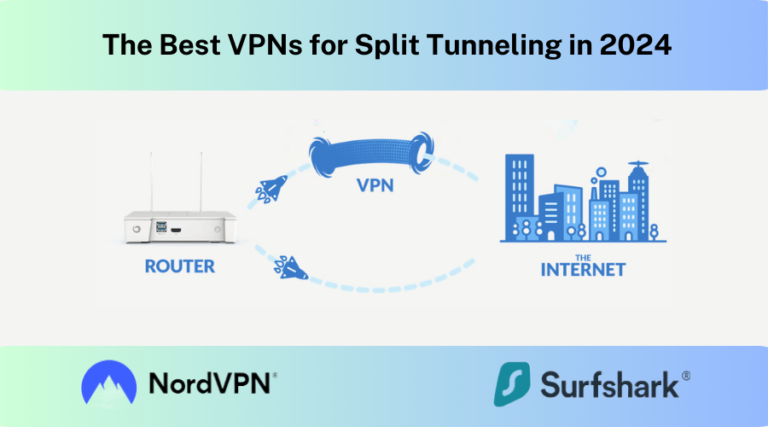
Split tunneling is a feature available on some of the best VPNs of 2024 that enables users to decide which connection goes through the VPN connection and which one directly.
This feature is quite beneficial for those who need to protect certain activities like online banking or work-related tasks while preventing high-speed access to local content, for example, streaming services or games.
In 2024, the need for secure and efficient internet connections is more critical than ever, and split tunneling has been developed to provide individual solutions for the user’s internet experience.
Whether you’re working remotely, managing sensitive data, or simply looking to optimize your internet speed, understanding how split tunneling works and which VPNs offer the best features can make a significant difference in your online experience.
This article will explore the best VPNs for split tunneling in 2024, highlighting their unique features, benefits, and how they stand out in the crowded VPN market. If you’re new to VPN split tunneling, start with our guide on Understanding VPN Split Tunneling to learn how it works and why it’s beneficial.
At the end of the article, you will find which VPN providers provide the best split tunneling options and what makes this feature so powerful for your Internet use.
Types of Split Tunneling
Split tunneling is available in different types, and each provides varying levels of control to the user on internet traffic.
Knowledge of these types will assist a user in selecting the most appropriate splitting tunneling depending on the requirement or the VPN service being used. Here are the main types of split tunneling available in 2024:
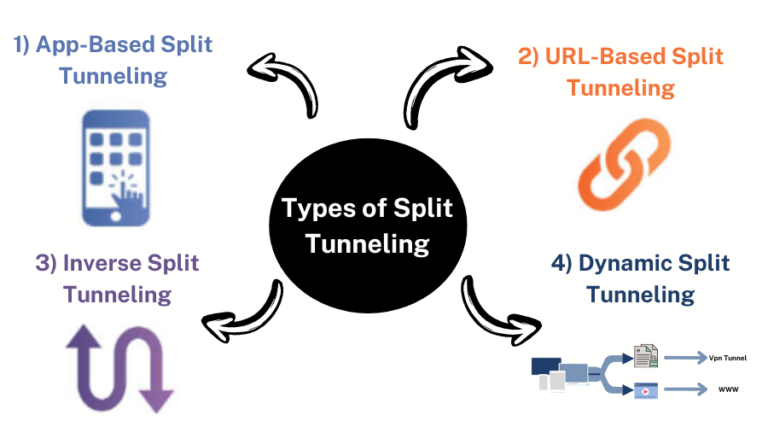
1. App-Based Split Tunneling
The app-based split tunneling app allows the user to select which applications should connect through the VPN and which should not.
For example, you can route your web browser through the VPN for secure browsing while allowing your streaming apps to bypass the VPN to achieve higher internet speeds and access geo-restricted content.
This type is ideal if you want to secure specific activities without slowing down your overall internet connection.
2. URL-Based Split Tunneling
URL-based split tunneling, also known as domain-based tunneling, gives you the flexibility to select specific websites that should bypass the VPN.
This type is particularly useful for accessing local websites that might block VPN traffic while securing sensitive online activities. It is very useful for users who require simultaneous use of local and international websites.
3. Inversive Split Tunneling
Inversive split tunneling, or inverse split tunneling, works opposite of how standard split tunneling works.
Instead of choosing which traffic goes through the VPN, you specify which traffic does not. By default, all your internet traffic is routed through the VPN, with only selected apps or websites excluded.
This type provides a relatively higher level of security guarantee because most of your data are shielded. At the same time, the chance to have direct normal access to some of the non-sensitive sites without passing through the VPN encryption is also possible.
4. Dynamic Split Tunneling
Dynamic split tunneling automatically adjusts the routing of traffic based on the type of content or network conditions. This advanced feature makes VPN route the traffic automatically, enhancing the performance and security without any interference.
It is a dynamic form of split tunneling where changes are done dynamically. Hence, it works well for users who want to set up the system instantly. By choosing the right type of split tunneling, you can enhance your VPN experience, balancing security, speed, and access according to your specific needs.
Whether you’re using app-based, URL-based, Inversive, or dynamic split tunneling, understanding these options helps you make the most of your VPN’s capabilities.
Pros & Cons of Split Tunneling Feature
Split tunneling offers a mix of Pros & Cons that can impact your online experience. Here’s a clear breakdown of the pros and cons of using split tunneling:
| Pros | Cons |
|---|---|
| Improved Speed: Only routing essential traffic through the VPN can enhance internet speed, as non-essential traffic bypasses the VPN encryption process. | Security Risks: Traffic not routed through the VPN remains unencrypted, exposing it to potential threats like hacking or data interception. |
| Bandwidth Efficiency: By allowing non-sensitive activities to bypass the VPN, you can save on bandwidth, which is especially useful on limited data plans. | Data Leaks: Misconfiguration of split tunneling can lead to accidental exposure of sensitive data if certain apps or websites are not properly secured. |
| Access to Local and Restricted Content: You can access local websites or services without VPN restrictions, while still securing your sensitive activities through the VPN. | Reduced Privacy: With split tunneling, your ISP can still monitor the traffic that doesn’t go through the VPN, potentially compromising your overall privacy. |
| Customizable Security: Split tunneling gives you the control to secure only the most critical parts of your online activity, such as work tasks or financial transactions. | Complex Setup: Configuring split tunneling can be more complex compared to a full VPN setup, requiring careful management to ensure the right traffic is protected. |
Split tunneling offers significant advantages, like improved speed and customized security, making it a great tool for many users. However, it should be used carefully due to security risks and the possibility of data leakage. Understanding these pros and cons lets you decide whether split tunneling suits your needs.
Full Tunnel vs Split Tunnel VPN
Choosing between a full tunnel and split tunnel VPN setup depends on the client’s needs for security, speed, and accessibility. Here’s a detailed comparison to help you understand the differences and decide which option is best.
Full Tunnel VPN
It is a full tunnel VPN in which all your internet traffic passes through the VPN server. This means every activity, from browsing to streaming, is encrypted and protected by the VPN. It has an advanced security and protection feature, making it suitable for users and increasing the safeguard for all their internet operations.
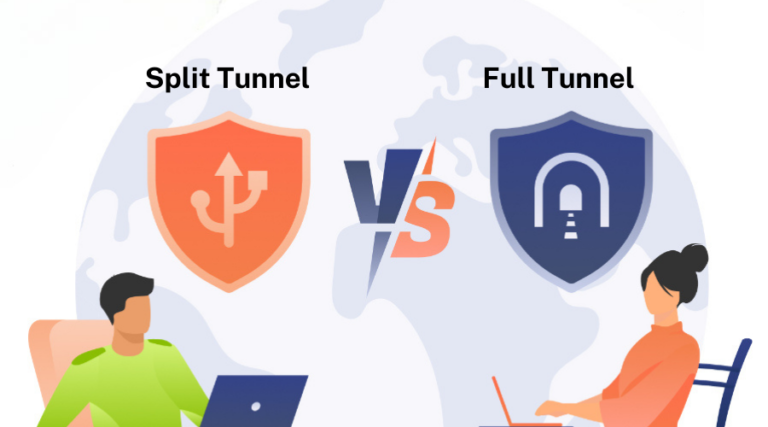
Advantages of Full Tunnel VPN:
- Maximum Security: All data is encrypted, ensuring that none of your online activities are exposed.
- Consistent IP Address Masking: Your IP address is hidden for all traffic, maintaining complete anonymity.
- Enhanced Privacy: Full tunnel VPN prevents your ISP or any other third parties from monitoring your internet activities.
Disadvantages of Full Tunnel VPN:
- Potential Speed Reductions: Routing all traffic through the VPN can slow down your internet speed due to the encryption process.
- Restricted Access to Local Content: Some local services or websites may be inaccessible when using a VPN, as they might block VPN IP addresses.
- Increased Bandwidth Usage: Since all data must go through the VPN, the amount of data used per given time period may be higher, and this is an issue for those using limited data.
Split Tunnel VPN
A split tunnel VPN allows you to select which traffic goes through the VPN and which goes directly to the internet. This offers a balanced approach, providing VPN protection for specific activities while maintaining speed and accessibility for others.
Advantages of Split Tunnel VPN:
- Improved Speed: By routing only essential traffic through the VPN, you can maintain faster speeds for non-sensitive activities.
- Flexible Access: Access local content and services without interruption while still securing critical data.
- Optimized Bandwidth Usage: Saves bandwidth by excluding non-essential traffic from the VPN, which is beneficial for users with data limits.
Disadvantages of Split Tunnel VPN:
- Partial Protection: Only selected traffic is secured, which leaves other activities exposed to potential threats.
- Privacy Limitations: ISPs and other third parties can still monitor traffic that bypasses the VPN.
- Configuration Complexity: Setting up split tunneling requires careful management to ensure that sensitive data is not unintentionally exposed.
| Feature | Full Tunnel VPN | Split Tunnel VPN |
|---|---|---|
| Security | Maximum, all data encrypted | Partial, only selected data secured |
| Speed | Potentially slower due to full encryption | Faster, as only essential traffic is encrypted |
| Access to Local Content | Limited, as all traffic is routed through VPN | Flexible, allows access to local services |
| Privacy | Complete privacy for all activities | Partial privacy, some traffic exposed |
| Bandwidth Usage | Higher, all data goes through VPN | Lower, as non-essential traffic bypasses VPN |
Choosing between a full tunnel and split tunnel VPN setup ultimately depends on your priorities. If maximum security and privacy are your main concerns, a full tunnel VPN is the way to go. However, if you need a balance of speed, access, and protection, split tunneling offers the flexibility you need.
NordVPN Split Tunneling: Features and Benefits
NordVPN offers split tunneling, a top VPN service with advanced security features, ease of use, and compatibility with most devices. This article explains its basic principles and 2024 features.
In this guide, you can learn the basic principles of Nord VPN’s split tunneling, its features, and the benefits it offers in 2024:
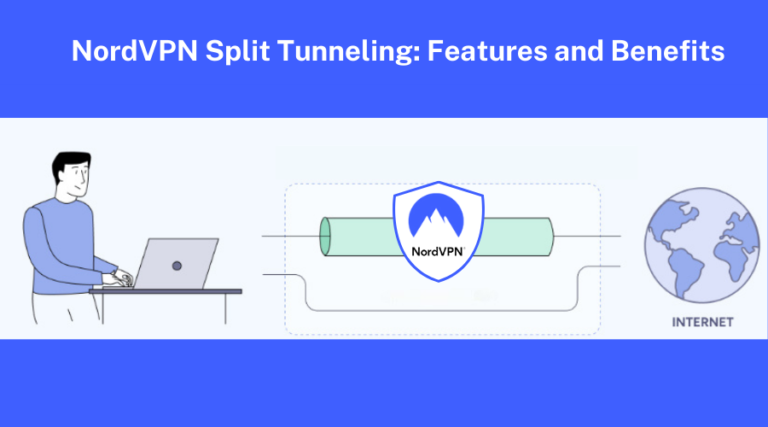
Features of NordVPN Split Tunneling
- App-Based Split Tunneling:
NordVPN’s split tunneling feature enables users to choose specific apps that should use the VPN connection while others bypass it. This is especially important for those activities that need to be conducted via a secure connection, such as online banking or work-related access to files. - Flexible Setup:
NordVPN provides an easy setup process for split tunneling directly through its app. You can quickly toggle split tunneling on or off and customize which apps use the VPN. This flexibility allows you to optimize your internet connection without compromising security for critical tasks. - Available on Multiple Platforms:
NordVPN’s split tunneling is available on various platforms, including Windows, Android, and specific router configurations. It is also possible to use it from a desktop or mobile device or when protecting an entire home network. - User-Friendly Interface:
NordVPN’s app interface makes configuring split tunneling simple, even for beginners. You can set up your preferred configuration with clear options and intuitive settings without hassle.
Benefits of Using NordVPN Split Tunneling
- Enhanced Performance:
NordVPN allows selective routing, ensuring only essential traffic is sent, allowing high-speed streaming and gaming. This secures important work without compromising performance for everyday tasks.
- Optimized Bandwidth Usage:
NordVPN’s split tunneling optimizes bandwidth usage by excluding non-essential traffic, making it beneficial for users on limited data and allowing for appropriate allocation of the limited package.
- Secure and Private Access:
NordVPN’s strong encryption ensures secure and private traffic, protecting sensitive information like work-related data and financial transactions from third-party interceptions. It also allows for the smooth flow of all other traffic through the VPN.
- Accessibility to Local Content:
With split tunneling, you can access local content without turning off the VPN entirely. This means you can continue streaming local shows or using local services that might block VPN traffic while still securing your sensitive data.
- Customizable Security:
NordVPN’s split tunneling feature offers a tailored approach to your online security. You can easily adjust which apps or activities are protected by the VPN, providing a personalized balance between privacy and accessibility.
NordVPN’s split tunneling feature is a powerful tool that enhances your online experience by giving you control over which traffic to secure. The security and excellent performance associated with it, as well as the simplicity of use, make split tunneling ideal for anyone interested in using it in 2024.For a more in-depth analysis of NordVPN’s performance and features, check out our comprehensive NordVPN Review.
Surfshark Split Tunneling: Features and Benefits
Surfshark, a Best VPN provider, is renowned for its robust security features and user-friendly split tunneling capabilities. Its popularity in 2024 is due to its ability to provide users with more freedom and flexibility in internet browsing. Here’s an in-depth look at Surfshark’s split tunneling features and the benefits it offers:
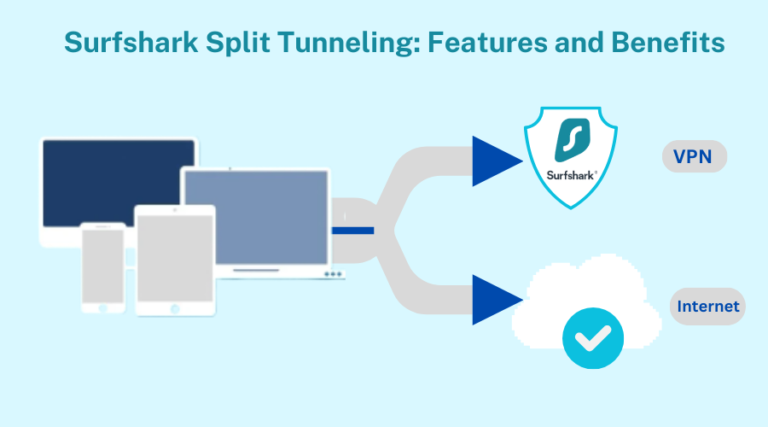
Features of Surfshark Split Tunneling
- Bypasser (Split Tunneling) for Apps and Websites:
Surfshark’s Bypasser feature allows users to configure apps or websites to function without a VPN connection. It allows them to lock down vulnerable apps like email or online banking while allowing other apps like Netflix to access the internet directly.
- Platform Availability:
Surfshark’s Bypasser is a flexible tool that supports both Windows and Android devices, making it ideal for mobile users who want to save data or stay connected with local content while on the move.
- Easy-to-Use Interface:
A user-friendly design of Surfshark facilitates the process of configuring split tunneling easily. Most of the features of the Bypasser are available in the main settings of the app, where you can simply choose which of the applications or websites should switch to VPN.
- Comprehensive Control Options:
Surfshark VPN allows you to adjust your split tunneling preferences, whether you want to apply it to just a few applications or multiple services. This level of control makes Surfshark a flexible choice for users with different needs.
Benefits of Using Surfshark Split Tunneling
- Improved Internet Speed:
Split tunneling allows you not to use the VPN for all the connections and enjoy a fast internet connection during tasks that do not require eminent protection by the VPN service. This is especially helpful for streaming games or downloading files that demand optimal speed.
- Efficient Bandwidth Usage:
Surfshark’s Bypasser allows you to optimize your bandwidth as Surfshark bypasses the unnecessary traffic to the VPN. This feature is recommended for users with limited bandwidth since only important activities will consume the VPN connection.
- Seamless Access to Local and Global Content:
With Surfshark’s split tunneling, you can use both regional access and privacy on the VPN at the same time. This means that you can have your favourite local shows with no interruption while, on the other side, shielding your encrypted activities online.
- Enhanced Security for Sensitive Activities:
Surfshark VPN uses strong encryption protocols to secure the traffic that goes through the VPN, ensuring your sensitive data remains protected. For personal information or business-related activities, Surfshark’s split tunneling offers adequate protection with no compromise on speed.
- Customizable User Experience:
Surfshark’s split tunneling feature offers a customizable experience, allowing you to choose which apps or websites benefit from VPN protection. This particularly benefits users who prefer custom solutions to their internet security needs.
Surfshark’s split tunneling, with its user-friendly Bypasser feature, provides a balanced mix of speed, security, and flexibility. In 2024, it remains a top choice for anyone who wants to get the best from a VPN while only focusing on the parts of your browsing that you wish to protect.
Comparison of the Best VPNs for Split Tunneling
Here’s a detailed comparison of the best VPNs for split tunneling in 2024, focusing on NordVPN, Surfshark, ExpressVPN, CyberGhost VPN, and Private Internet Access (PIA). This table highlights their key features, split tunneling options, and what makes each VPN stand out.
| Feature | NordVPN | Surfshark | ExpressVPN | CyberGhost VPN | Private Internet Access (PIA) |
|---|---|---|---|---|---|
| Split Tunneling Availability | App-Based (Windows, Android) | Bypasser (Windows, Android) | App-Based (Windows, macOS, Android) | App-Based (Windows, Android) | App-Based (Windows, macOS, Linux, Android) |
| Security Features | AES-256 Encryption, Double VPN, No-logs Policy | AES-256 Encryption, MultiHop, No-logs Policy | AES-256 Encryption, TrustedServer Technology | AES-256 Encryption, No-logs Policy, Ad Blocker | AES-256 Encryption, No-logs Policy, MACE Ad Blocker |
| Device Compatibility | Windows, macOS, Android, iOS, Linux, Routers | Unlimited devices across all platforms | Windows, macOS, Android, iOS, Linux, Routers | Windows, macOS, Android, iOS, Linux, Routers | Windows, macOS, Android, iOS, Linux, Routers |
| Speed and Performance | High speed, optimized for streaming and gaming | Great speed, excellent for unlimited devices | Fast speeds, consistently high performance | Good speed, optimized servers for streaming | Reliable speed, excellent for torrenting |
| Unique Selling Points | Double VPN, Threat Protection | Unlimited devices, CleanWeb ad blocker | TrustedServer tech, great for bypassing censorship | Dedicated servers for streaming, user-friendly apps | Highly customizable settings, large server network |
Conclusion : Use Best VPNs for Split Tunneling
Split tunneling is a valuable feature that offers enhanced security for your sensitive activities and improved performance for everyday tasks.
In 2024, NordVPN and Surfshark are two of the most suitable VPNs for split tunneling; however, each offers unique benefits that cater to different user needs.
NordVPN shines with the App-based split tunneling feature, strong security features, and a highly user-friendly application across various devices. It is a good option for users who need security and flexibility for other connections; the application will provide high speed, making all the necessary activity safe without slowing down the others.
Surfshark, with its intuitive Bypasser feature, allows users to control which applications and URLs bypass VPN processing. It’s ideal for those regulating bandwidth usage and offers local and international content. With support for multiple devices and cost efficiency, Surfshark is an excellent choice for those seeking affordable pricing.
When choosing the best VPN for split tunneling, consider your specific needs like security, speed, or accessibility. NordVPN and Surfshark are the most security-oriented VPNs and user-friendly simultaneously.
ExpressVPN is the fastest VPN with a vast network of servers. CyberGhost has the longest money-back guarantee period, which is good for cautious users. PIA has servers with highly customizable settings.
Split tunneling allows you to control your internet connection, providing the right level of privacy and speed. When used with the right VPN, it enhances security without causing a slowdown in browsing, unlike traditional security measures that slow down the internet connection.
FAQs : Best VPNs for Split Tunneling
1. Is Split Tunneling Available on All VPN Services?
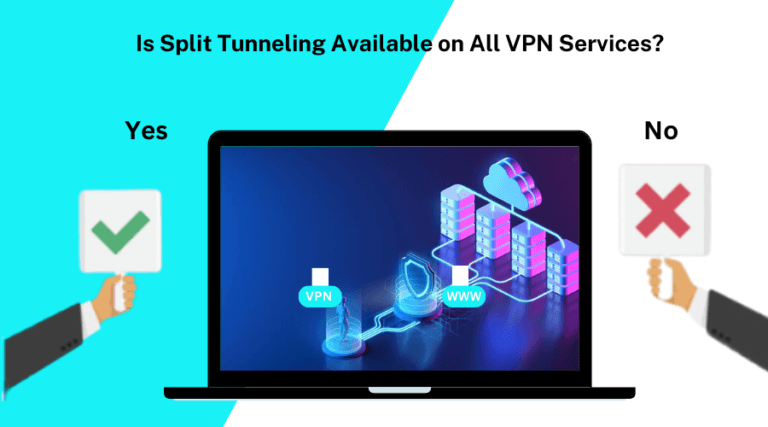
It is important to note that not all VPN services offer users the option of split tunneling. Split tunneling features are available with premium VPN providers such as NordVPN, Surfshark, ExpressVPN, CyberGhost VPN, and Private Internet Access (PIA).
However, the features and types may vary depending on the platform or VPN service used. Some VPNs allow app-based split tunneling on multiple operating systems, while others only support it on specific devices.
2. How Do I Know if Split Tunneling Is Enabled?
To check if split tunneling is enabled, access the VPN app’s settings. Most VPNs have a dedicated section for setting which applications or websites can connect to the VPN.
After setting it up, check your traffic via the VPN app’s dashboard or network connection settings to see if desired apps or websites are excluded from the VPN connection. In contrast, others continue through the VPN connection.
3. What Are the Best VPNs with Split Tunneling Features?
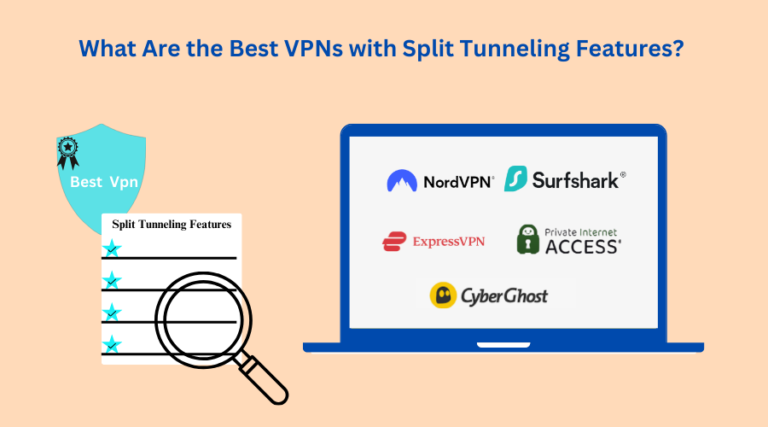
In 2024, Best VPNs with split tunneling features include NordVPN, Surfshark, ExpressVPN, CyberGhost VPN, and Private Internet Access.
These VPNs offer customizable online security, user-friendly interfaces, strong security protocols, and reliable performance across various devices and platforms.
4. Which Protocols Don’t Support Split Tunneling?
Not all VPN protocols support split tunneling. Generally, split tunneling is most commonly available with protocols like OpenVPN and IKEv2/IPSec.
Modern protocols like WireGuard are also gaining support. It’s crucial to check with your VPN service provider to ensure they are compatible with split tunneling, as some protocols may be outdated or less popular.
5. Does Split Tunneling Slow Down the Internet?
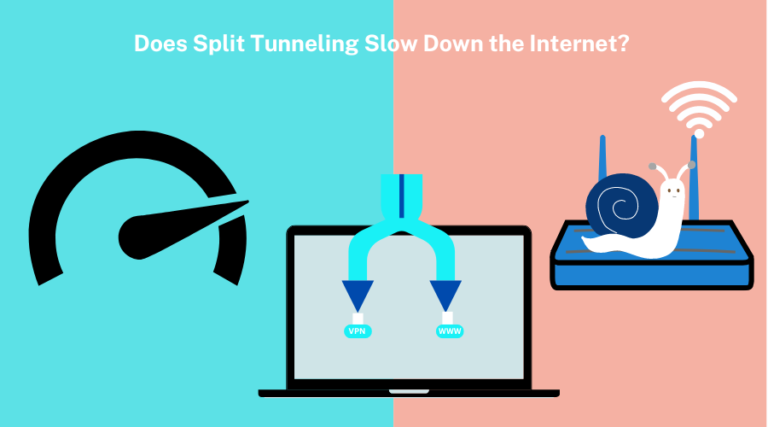
Split tunneling is a feature that optimizes internet connection speed by routing unnecessary traffic without using a VPN. It reduces VPN load and improves internet speed by reducing the load on the VPN.
However, the speed depends on the quality of the VPN connection and activities running through or outside the VPN. It is typically used for tasks requiring higher bandwidth, such as streaming or gaming.
